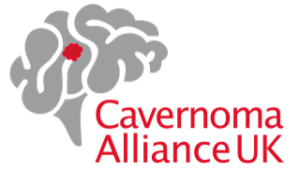Gut health
and diet
Interest in the connection between gut health and cavernoma is growing as research begins to explore how the gut microbiome, the community of bacteria living in our digestive system, may influence neurological conditions. This remains a new and developing area, and while findings so far are promising, they do not yet change clinical guidance or treatment. The information below summarises what is currently known about gut health, diet and cavernoma, and offers some practical steps to support overall wellbeing.
Why does gut health matter?
Research is exploring whether changes in the gut microbiome may play a role in various neurological conditions, including cavernoma, but this is still a new and developing area. The gut microbiome is the collection of bacteria that live in our digestive system. These bacteria help with digestion, support the immune system, and play a role in overall health. Everyone’s microbiome is different, and it can be affected by things like diet, stress, illness, and antibiotics.
Scientists believe that the gut and brain are connected through chemical signals. Bacteria in the gut produce molecules that can enter the bloodstream and travel to other parts of the body, including the brain. In some studies, a molecule called lipopolysaccharide (LPS), which is made by certain gut bacteria, has been linked to increased cavernoma activity in mice with specific gene changes (such as CCM1, CCM2 or CCM3). A few small studies in people have also found higher LPS levels in those with cavernoma, but we don’t yet know what this means for health or treatment. For more information see guidance from our US sister organisation, Alliance to Cure.
For those who would like to explore the research, below are some of the key studies. These are interesting and promising, but still early and do not change clinical guidance or treatment decisions:
What can I do to support gut health?

Although the research on cavernoma and the gut is still in early stages, there are some healthy habits that may support your overall wellbeing:
- Eat a balanced diet with plenty of vegetables, whole grains, and fibre
- Limit processed foods, especially those containing emulsifiers
- Maintain healthy vitamin D levels through safe sun exposure, food, or supplements
- Speak to a healthcare professional before taking new supplements, including probiotics
For practical ideas, you may enjoy the CCM Healthy Cookbook from our US sister organisation, Alliance to Cure. This digital download offers nutritious recipes and wellness tips created with the cavernoma community in mind.
Common questions
What do we know about Vitamin D?
Vitamin D supports bone health and the immune system. Some studies suggest that low levels of vitamin D may be linked with more cavernoma activity, including a higher chance of bleeding. One small study found that people who took vitamin D supplements had fewer bleeds, even after taking other risk factors into account. This is promising but early research, and more studies are needed. That said, keeping your vitamin D levels in a healthy range is good for general wellbeing, and the NHS recommends supplements for many people, especially in the winter months. If you’re unsure, talk to your doctor.
What Is ‘Leaky Gut’ and is it relevant?
The gut has a protective barrier made of cells and mucus that helps control what enters the body from the digestive system. When this barrier is weakened, it may allow substances like LPS to pass into the bloodstream. This is sometimes referred to as ‘leaky gut’.
‘Leaky gut’ is not a recognised medical diagnosis, but the term is commonly used in health discussions. Some researchers are exploring whether a weakened gut barrier might play a role in inflammation or in conditions like cavernoma. This is still being investigated.
Are emulsifiers safe to eat?
Emulsifiers are food additives used in many processed foods to improve texture and shelf life. They are commonly found in items like ice cream, salad dressings, dairy-free milks, and baked goods. In mice with cavernoma-related gene changes, certain emulsifiers have been linked to increased lesion formation. Researchers believe this may be because emulsifiers can affect the gut lining. This hasn’t been confirmed in humans.
Some people living with cavernoma choose to limit how much processed food they eat, as these foods often contain emulsifiers. This can be part of maintaining a balanced, healthy diet. Emulsifiers must be listed in the ingredients, so checking food labels can help you cut down if you decide to do so as part of a healthy diet that is low in processed foods.
Should I take probiotics?
Probiotics are supplements that contain live bacteria and are sometimes taken to support gut health. At present, there is no scientific evidence to show that probiotics are helpful – or harmful for people with cavernoma.
Some anecdotal reports have mentioned bleeds after taking probiotics, but these are not supported by formal research. If you’re considering taking probiotics, it’s a good idea to speak with your GP or specialist first.
